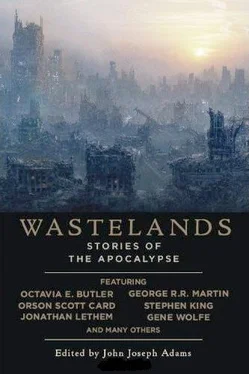It was nearly six months before he went home. Van helped him along, riding cover behind him on the bicycles they used to get around town. The further north they rode, the stronger the smell of burnt wood became. There were lots of burnt-out houses. Sometimes marauders burnt the houses they’d looted, but more often it was just nature, the kinds of fires you got in forests and on mountains. There were six choking, burnt blocks where every house was burnt before they reached home.
But Felix’s old housing development was still standing, an oasis of eerily pristine buildings that looked like maybe their somewhat neglectful owners had merely stepped out to buy some paint and fresh lawnmower blades to bring their old homes back up to their neat, groomed selves.
That was worse, somehow. He got off the bike at the entry of the subdivision and they walked the bikes together in silence, listening to the sough of the wind in the trees. Winter was coming late that year, but it was coming, and as the sweat dried in the wind, Felix started to shiver.
He didn’t have his keys anymore. They were at the data-center, months and worlds away. He tried the door-handle, but it didn’t turn. He applied his shoulder to the door and it ripped away from its wet, rotted jamb with a loud, splintering sound. The house was rotting from the inside.
The door splashed when it landed. The house was full of stagnant water, four inches of stinking pond-scummed water in the living room. He splashed carefully through it, feeling the floor-boards sag spongily beneath each step.
Up the stairs, his nose full of that terrible green mildewy stench. Into the bedroom, the furniture familiar as a childhood friend.
Kelly was in the bed with 2.0. The way they both lay, it was clear they hadn’t gone easy — they were twisted double, Kelly curled around 2.0. Their skin was bloated, making them almost unrecognizable. The smell — God, the smell.
Felix’s head spun. He thought he would fall over and clutched at the dresser. An emotion he couldn’t name — rage, anger, sorrow? — made him breathe hard, gulp for air like he was drowning.
And then it was over. The world was over. Kelly and 2.0 — over. And he had a job to do. He folded the blanket over them — Van helped, solemnly. They went into the front yard and took turns digging, using the shovel from the garage that Kelly had used for gardening. They had lots of experience digging graves by then. Lots of experience handling the dead. They dug, and wary dogs watched them from the tall grass on the neighboring lawns, but they were also good at chasing off dogs with well-thrown stones.
When the grave was dug, they laid Felix’s wife and son to rest in it. Felix quested after words to say over the mound, but none came. He’d dug so many graves for so many men’s wives and so many women’s husbands and so many children — the words were long gone.
Felix dug ditches and salvaged cans and buried the dead. He planted and harvested. He fixed some cars and learned to make biodiesel. Finally he fetched up in a data-center for a little government — little governments came and went, but this one was smart enough to want to keep records and needed someone to keep everything running, and Van went with him.
They spent a lot of time in chat rooms and sometimes they happened upon old friends from the strange time they’d spent running the Distributed Republic of Cyberspace, geeks who insisted on calling him PM, though no one in the real world ever called him that anymore.
It wasn’t a good life, most of the time. Felix’s wounds never healed, and neither did most other people’s. There were lingering sicknesses and sudden ones. Tragedy on tragedy.
But Felix liked his data-center. There in the humming of the racks, he never felt like it was the first days of a better nation, but he never felt like it was the last days of one, either.
> go to bed, felix
> soon, kong, soon—almost got this backup running
> youre a junkie, dude.
> look whos talking
He reloaded the Google homepage. Queen Kong had had it online for a couple years now. The Os in Google changed all the time, whenever she got the urge. Today they were little cartoon globes, one smiling the other frowning.
He looked at it for a long time and dropped back into a terminal to check his backup. It was running clean, for a change. The little government’s records were safe.
> ok night night
> take care
Van waved at him as he creaked to the door, stretching out his back with a long series of pops.
“Sleep well, boss,” he said.
“Don’t stick around here all night again,” Felix said. “You need your sleep, too.”
“You’re too good to us grunts,” Van said, and went back to typing.
Felix went to the door and walked out into the night. Behind him, the biodiesel generator hummed and made its acrid fumes. The harvest moon was up, which he loved. Tomorrow, he’d go back and fix another computer and fight off entropy again. And why not?
It was what he did. He was a sysadmin.
The Last of the O-Forms
by James Van Pelt
James Van Pelt is the author of the novel Summer of the Apocalypse , and nearly 90 short stories, which have mostly appeared in Analog, Asimov’s, Realms of Fantasy , and Talebones . He also has two collections, Strangers and Beggars and The Last of the O-Forms and Other Stories .
Van Pelt had been writing a series of stories about slower-than-light ark ships fleeing Earth, when it occurred to him that he had generalized that the ark ship passengers were escaping from the “mutation plagues,” and it might be interesting to write about what was going on back on Earth. Thus, “The Last of the O-Forms” was born.
This story, which was a finalist for the Nebula Award, takes place in a world where there are no more normal births. Each and every one is a mutation—which is both good and bad for Dr. Trevin’s Traveling Zoological Extravaganza…
Beyond the big rig’s open window, the Mississippi river lands rolled darkly by. Boggy areas caught the moon low on the horizon like a silver coin, flickering through black-treed hummocks, or strained by split-rail fence, mile after mile. The air smelled damp and dead-fish mossy, heavy as a wet towel, but it was better than the animal enclosures on a hot afternoon when the sun pounded the awnings and the exhibits huddled in weak shade. Traveling at night was the way to go. Trevin counted the distance in minutes. They’d blow through Roxie soon, then hit Hamburg, McNair, and Harriston in quick secession. In Fayette, there was a nice diner where they could get breakfast, but it meant turning off the highway and they’d hit the worst of Vicksburg’s morning traffic if they stopped. No, the thing to do was to keep driving, driving to the next town, where he could save the show.
He reached across the seat to the grocery sack between him and Caprice. She was asleep, her baby-blonde head resting against the door, her small hands holding a Greek edition of the Odyssey open on her lap. If she were awake, she could glance at the map and tell him exactly how many miles they had left to Mayersville, how long to the minute at this speed it would take, and how much diesel, to the ounce, they’d have left in their tanks. Her little-girl eyes would pin him to the wall. "Why can’t you figure this out on your own?" they’d ask. He thought about hiding her phone book so she’d have nothing to sit on and couldn’t look out the window. That would show her. She might look two years old, but she was really twelve, and had the soul of a middle-aged tax attorney.
At the sack’s bottom, beneath an empty donut box, he found the beef jerky. It tasted mostly of pepper, but underneath it had a tingly, metallic flavor he tried not to think about. Who knew what it might have been made from? He doubted there were any original-form cows, the o-cows, left to slaughter.
Читать дальше












